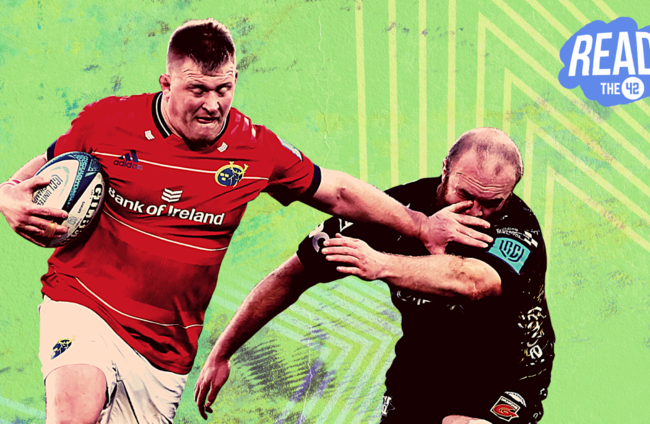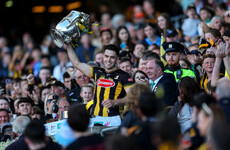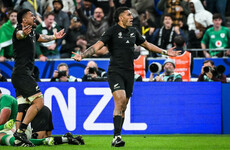JOHN RYAN LEFT the coach’s office. He walked down the stairs at Munster’s high performance centre, past the framed pictures of Miracle Matches and European Cups, images of better days than this one.
It was the Tuesday before Christmas. Some people call this thing he does a game but he knows it as a job, especially on this day, the one he’ll remember as the afternoon when a man told him he was going to have to find a new employer.
“A nice Christmas present,” he says with bitter irony.
Outside, rain fell. His original plan that day had been to do some last-minute shopping. That would have to wait. Instead he took the short drive home to tell his wife the news. “We had moved into a new house a fortnight earlier; this was where we wanted to put down roots,” Ryan recalls.
Now, he’d have to move, on the assumption some other club would want a 33-year-old. “I had a really tough Christmas,” Ryan says. You can understand why. Recruiters shop for turkey and ham in December rather than tightheads. The Cork-man would have to wait until the New Year before the phone would ring.
When the call came from Wasps – the club he’ll join next season, it was 11 years to the day since he received a similar one from Tony McGahan, then Munster’s coach. McGahan wanted to know if Ryan was interested in turning pro with his home province.
He thought back to those days, the madness of juggling rugby with work as a bouncer and completing a degree in UCC, getting home at 3am from one job, waking up five hours later to start the next. The stress of that lifestyle impacted his health. He suffers from ulcerative colitis, an illness that reached crisis point in 2014, when he lost 12kg in weight over a two-week period.
Yet even then, when he was bedridden and drained of energy, he still dragged himself up to go training, thinking that was the kind of thing a player needed to do to get a new contract. “Go home,” Anthony Foley told him after Ryan landed at UL that Monday morning. “You’re not well.”
That was the sort of club Munster was, he thought, one that stood by you.
But he should have known better. As a teenager, prior to that phone call from McGahan, he’d been let go from Munster’s sub-academy, a rejection that cut to the bone, so much so that for years he had imposter syndrome. The irony is that by last December, when he was told he was going to be released, that insecurity had disappeared.
“This was the time I actually thought, ‘I’m happy, I’m safe now; I have another few years left in me’.
“As well as that, I am a Munster man born and bred, and if you are playing well enough, you should be retained because it’s important to have a Munster team with a lot of Munster-born (players) in it. People coming into the club can become Munster men as well, I get that.
“But being here from the start of my career, I thought I’d be kept on. It was a surprise when I got the news, I won’t lie.”
- See sport differently with The42 Membership and get closer to the stories that matter with exclusive analysis, insight and debate. Click here to find out more>
Johann van Graan was the person who delivered it. While Ryan likes the South African on a personal level, calling him ‘a good, nice man’, you can understand why he disagreed with certain decisions. For a three-year period, from 2016 to 2019, he was a regular in Joe Schmidt’s Ireland squad but benched for several of Munster’s big games.
“Things changed for me when Johann came in (to Munster in November 2017). He saw me as an impact player. I kind of had words with him a few times because if you are not starting, you are not going to be making the Irish team. It was a difficult time.”
And yet it was also the time in his career when he made his biggest impact with Ireland, featuring twice in Ireland’s grand slam campaign, starting against Australia in the first test of their successful 2018 tour.
That was when John Ryan knew he had made it. He’d left school as a kid with lots of talent but not enough confidence to reach for the big time. But by 21, a year-and-a-half after his release from the academy, he’d got himself fit and noticed.
He loved training, the gym especially. He started out as a loosehead, switched between the No1 and No3 jerseys for a while, then eventually told Foley he was going to specialise as a tighthead. It scared and excited him at the same time. Before long, he’d mastered the position, and Schmidt liked what he saw.
Twenty-four times Ryan played for Ireland; twenty-one times Ryan won for Ireland. His immediate response to hearing about that win ratio is telling. “I remember the three losses.”
You wonder why he thinks that way. And then he tells you about arriving late to the show, the pain felt when he was cut from the academy squad, the time it took to feel accepted. “The (academy) rejection knocked me confidence wise. It was only a year later when the coaches at UCC sat me down that things changed. They believed in my ability to go pro at a time when I certainly didn’t.
“First time I played for Munster, September 2011, I didn’t think it was going to happen until my name was read out.”
He’d go on to feature a further 196 times for the province.
But one game stands out more than the rest; 22 October 2016, Thomond Park, Munster against Glasgow in the Champions Cup, the day after Foley had been laid to rest.
“You bury your head coach on a Friday and then you play a game on a Saturday, I don’t think another team in the world has ever had to do something like that. What we did that day against Glasgow, winning with 14 men, honouring Axel and his family, it was just incredible.”
Time has erased many of the memories but he recalls glancing up at the stands during the pre-match minute’s silence, the heightened emotions; the looks on all those faces. In every direction, he saw another reminder of Foley, the coach who mentored him nine years earlier with the Under 20s, who he confided in, who he could argue with over a selection decision but never stay mad with.
“He put a lot of faith in me. He backed me. I had a big point to prove to him in that 2016/17 season; I wanted to back him up, and I was still proving it after he was buried.”
A window was opening, he just didn’t realise it. Rugby is a technical game and eventually the technician got noticed. Schmidt watched that Glasgow game three times, once live, twice on tape. Something about Ryan appealed to him, the way he cleaned out rucks, the way he locked down a scrum, his willingness to carry in congested areas of the field.
It wasn’t just the little details. It was a man showing himself and anyone else who cared that he was ready to go up a level. Ireland were heading to Chicago to play the All Blacks a couple of weeks later, Schmidt deciding to bring the uncapped Ryan with him. “They told me at 11am, ‘get your bags John, you’re flying at three’.”
Fourteen years earlier, just a kid, he watched Ireland put it up to New Zealand in Auckland, capturing the attention of the rugby world. But that was from his front room. This time the view was a lot better. He was the 24th man. It had taken work, on his self-belief as much as his scrummaging, for Ryan to get this close to the stage.
A week later he was on it, Canada providing the opposition for his international debut. The caps kept coming. He came off the bench against France and Wales in the grand slam campaign and then, that summer, made his first Test start against a Tier 1 nation in Brisbane.
“I was so naïve. Like, the squad flew out to Australia in two separate parties and I was in the first travelling group, with Johnny (Sexton), Conor (Murray), Pete (O’Mahony), Robbie (Henshaw). There were 23 of us on that plane but it never once occurred to me that I might be in the 23-man squad for the opening Test until Joe pulled me aside two days beforehand.”
He did well in that game. Ireland lost but were leading Australia when he went off and Tadhg Furlong came on. “The way the game ended was a bit upsetting for me because it was a big opportunity and one that kind of went amiss, I thought.
“I actually played well to be fair, I was pretty happy with my game …… but it was just the result.”
On a personal level, the biggest result was that he’d won Schmidt’s trust. He’d continue to select him in the squad right until the end of his coaching tenure.
“That faith he had in me meant loads. He saw me as a set-piece operator; I don’t think I ever played a bad game for Ireland if I am honest. For me, I think I played to the standard that was expected of me. I wouldn’t say I am a complete baller, or say a world class operator, but I do think I am bloody good in the scrum and bloody good at what I do and he obviously saw value in that, so it means a lot when a fella like that values your strengths.”
It was Andrew Trimble who described Schmidt as a rugby version of Mr Miyagi, the wise old mentor from The Karate Kid; tough and uncompromising on one level, emotionally intelligent on another.
“That resonates,” says Ryan. “He would have gone hard at you in a team meeting (in front of everyone), but then he’d come up to you afterwards and quietly say, ‘listen, this is what I am trying to say here’. He had a certain way of doing things and it suited me to be honest. Knowing your detail is a big thing for him so if you weren’t able to get that bit right then you might as well leave.
“As Trimble says, he moulds you.”
One hundred and ninety seven games for Munster, 24 for Ireland, yet none of the numbers tell the story of his career quite like Ryan’s eyes as he left the pitch at the Kingspan on the first Friday of this month. He bowed his head, tucked his chin into his chest, made himself as small as possible.
This was quarter-final defeat No2 of his season, to add to a collection of misery that includes three final defeats and 10 semi-final losses over a Munster career. Along the way he saw smaller clubs, Glasgow, Connacht, Ospreys, Scarlets, Cardiff, Benetton, win silverware. He leaves Thomond Park empty handed.
“It doesn’t sit well with me because I came in during that 2010/11 season and was in the stand when we won that year’s (Pro12) final against Leinster. I was thinking, we can do things here.
“It is just so tough to take that we lacked consistency. Like, you play your heart out against Toulouse (in this year’s Champions Cup quarter-final), you match them, but then you lose on penalties and you feel sick. It emptied us and we just didn’t have anything left for the remainder of the season.
“You might think that is not a good sign of a team but I can say this truthfully, those two performances after (the defeat to Toulouse), against Leinster and Ulster, brought no lack of effort. There was 100 per cent a lack of execution and a lot of frustration because we could not even find third gear.”
And they heard all about it, fans, pundits, expressing their view. Some of the fiercest criticism stemmed from former Munster players and those words have not gone unheard.
“That hasn’t been good. I wouldn’t be a fan of that stuff at all. You can be critical but you don’t have to be nasty and I think some fellas have just gone over the top. If you have been in the system, you should always be part of that system. Some of their criticism has been very, very harsh. Those men were heroes of mine when I was younger. They are not heroes anymore.”
Still he believes there will be fewer complaints about Munster once Graham Rowntree gets his shot at the head coaching role.
“Wig (Rowntree) is a brilliant guy and I am saying that knowing that he probably had as much to do with me being let go as anyone. He is the right man for the job. I’m just gutted not to be a part of it.”
The tough thing is it wasn’t his decision to walk away. Others made that call. “I’ve a point to prove once again,” he says quietly, “and Wasps is the place to prove it. We are now where Leicester were about a year ago. We’re building something.”
He isn’t finished yet.
Get instant updates on your province on The42 app. With Laya Healthcare, official health and wellbeing partner to Leinster, Munster and Connacht Rugby.
* Rugby Players Ireland have helped Ryan prepare for the sporting afterlife. Educational engagement is one of RPI’s core principles in equipping their membership with the skills required to succeed both as professional athletes and successful individuals.
See sport differently with The42 Membership and get closer to the stories that matter with exclusive analysis, insight and debate. Click here to find out more>















That “contaminated Mexican beef” really gets around, doesn’t it?…